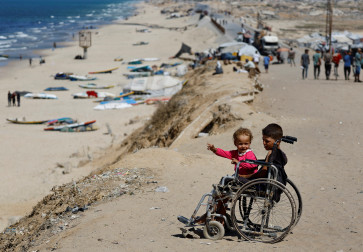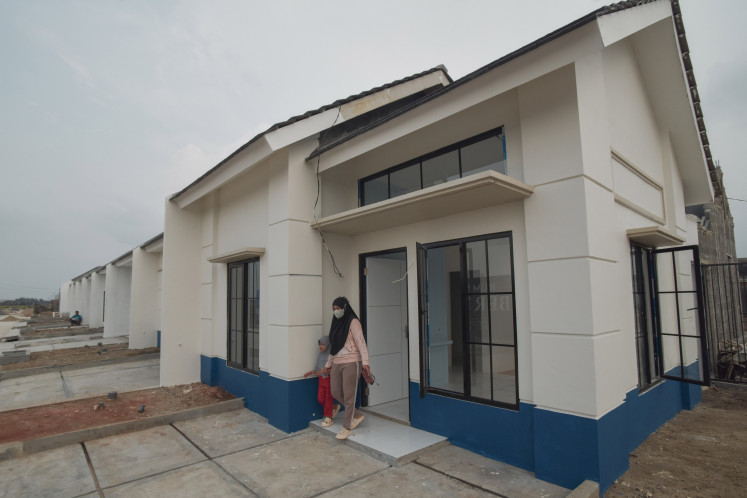Popular Reads
Top Results
Can't find what you're looking for?
View all search resultsPopular Reads
Top Results
Can't find what you're looking for?
View all search resultsMelly G. Tan: Promoting multiculturalism
Melly G
Change text size
Gift Premium Articles
to Anyone
Melly G. Tan will never forget the turbulent years she spent studying at the University of California in Berkeley, where she was the only Indonesian at the university's sociology department.
MELLY G. TAN: (JP/Ary Hermawan)
She was there from 1963 to 1968, during which great historical events took place in the United States and Indonesia.
"I was in my apartment getting ready for the first test of my first semester. Suddenly, the music on the radio stopped and there was an announcement that Kennedy had been shot," she said.
"I left my apartment to look for people, but there was no one in the building. I tried to call on the phone, but kept getting a busy signal. It was a frightening sensation, waiting to reach out to people and being unable to communicate with anyone.
"I was struck with the truth that we are indeed social beings," she wrote in her latest book, titled Etnis Tionghoa di Indonesia (Chinese Ethnics in Indonesia), an anthology of her scientific writings and essays on ethnicity, from the early 1990s to 2004.
She said that when she left for Berkeley it was not without apprehension. The economic situation under the Sukarno administration was heavily deteriorating and the Indonesian Communist Party (PKI) was gaining ground.
"For Indonesian students abroad, it was a terrible time of anxiety and uncertainty. The anxiety had begun in 1963, when Indonesia was leaning toward the left, the Eastern bloc. We students in the leading country of the Western bloc heard many rumors that our fellowships would be canceled."
Berkeley is far different from Cornell University where she obtained her master's degree. At Berkeley "neither faculty members nor students were interested in Indonesia as an area of study", she said.
Despite her apprehension, Melly completed her dissertation on the Chinese community in the U.S. in 1968 and returned to Jakarta as the first Indonesian female sociologist with a PhD.
When she returned to the Indonesian Institute of Sciences (LIPI), where she worked, she was virtually alone again. She had a "triple minority status", being a woman, a Chinese and a Roman Catholic.
However, it was no hindrance to her career and role as a scientist. Within a few months, she was appointed the head of the institute's division of social studies and was involved in setting up the division of population studies, one of the institute's strongest research centers.
For more than three decades, she researched and wrote a vast number of papers on gender, racial and poverty issues in the country.
Melly has contributed her thoughts toward finding solutions on the problem of national integration, especially with regard to minority ethnic Chinese.
She has received six honorary medals, including the Satyalancana Karya Satya and Bintang Mahaputra Pratama in 1995 and the Bintang Jasa Nararya in 2000, for her work and contributions to the country.
On June 11, Melly turned 78 and Atma Jaya University held a seminar to celebrate her birthday.
At the event, she received two gifts: the opening of a Melly G. Tan Reading Room at the university and the publication of a book titled Multikulturalisme, Peran Wanita dan Integrasi Nasional (Multiculturalism, Women's Roles and National Integration), a collection of articles dedicated to Melly.
Her lively gestures eclipsed her frail appearance as she greeted her long-time colleagues when the seminar ended.
As an ethnic Chinese having lived abroad for years, Melly knows very well how it feels to be a member of a minority group and knows the importance of recognizing differences.
"It is a given fact that we are a multicultural society. This is a fact whether you like it or not," she told The Jakarta Post on the sideline of the seminar.
"We have to think of the consequences, which is to be able to accept and respect our differences."
Melly said some Indonesians are unable to appreciate these differences.
"The problem we have here is that we have not seriously dealt with the fact that we are an ethnically and religiously plural society and reach a consensus of its implication."
The most recent indicator, she said, was the incident at Monas on June 1 when members of the Islam Defenders Front clashed with a number of people campaigning for religious freedom, in support of the Indonesian Ahmadiyah community.
"Even some of the Muslims here cannot settle their differences with other Muslims," she said.
She deplored the government's inability to manage differences in society, especially with the enactment of religion-inspired bylaws in the regions.
"This is an indication that the local leaders are unable to manage the existing differences," she said.
She said multiculturalism is a central idea in nation-building and crucial to sustainability.
In her writings, she shows that plurality exists not only in the context of Indonesia as a nation but also within the different groups themselves.
Her research on Chinese-Indonesian Muslims, who also take an active part in Islamic organizations such as Muhammadiyah, acts as a reminder to the country's majority ethnic group, who often overlook the fact that not all Chinese Indonesian are non-Muslims.
The article was originally written a few months before the May riots in 1998 when anti-Chinese sentiment exploded in Jakarta. In the revised version, she writes that even Chinese Muslims were not spared during the riots, when people put up signs in front of their homes and stores reading "Muslim" and "pribumi" (native) to escape the violence, for they were still asked: Are you a "pribumi" or "non-pribumi" Muslim?
As a scientist, Melly is concerned about her responsibility to properly represent her community. Charles Coppel, an associate professor at the University of Melbourne, writes in the preface of Melly's new book that after the bloody 1998 riots, Melly is no longer detached from her subject as she was in her earlier works.
She has moved from the question of assimilation and has focused more on discrimination and how to end it, he writes.
Melly, who gets annoyed when people say she was a member of the Berkeley Mafia, a pejorative term for Soeharto's first economic team, believes sociologists can contribute a lot to development, which is currently dominated by political and economic considerations.
"We need more sociologists who understand culture and can analyze social relationships. They could explain why different communities can or cannot cooperate. This, we have to realize, is very important," she says.










